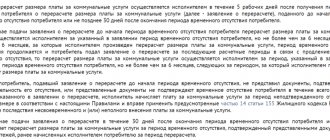An HOA may have a difficult time managing a home due to a lack of staff and resources, so the association board enters into a management agreement with the management company.
We will tell you what obligations fall on the management company and the homeowners association if a management agreement is concluded between them, and who pays fines in case of improper performance of work and services for the management of apartment buildings.
Interaction between management companies and homeowners associations
Direct contracts and intermediary
The housing and communal services sector in Russia has long switched to payments using unified payment documents (UPD) - this is when all payments for housing and utility services are indicated in one receipt.
Recipients of services pay the entire amount to the account of the management company, which, in turn, carries out settlements with resource supply organizations. On the one hand, it is simple and convenient - it is enough to pay one invoice, and the management company is responsible for payments to suppliers
. However, in reality everything turned out to be not quite so. The fact is that since the management company is responsible for paying the accruals, it is obliged to pay it in full and on time - regardless of when and to what extent the residents themselves pay this fee.
The problem has existed for years - many homeowners have long stopped paying for housing and communal services or pay with huge delays and not in full. Accordingly, management companies are forced to pay the difference at their own expense. A problem arises when most of the management companies are in a pre-bankruptcy state:
- some residents do not pay housing and communal services;
- The management company pays their share at its own expense;
- The management company itself receives this money from the residents for the maintenance and current repairs of the house, but due to the need to pay off the residents’ debts, there is no money left for this;
- services are not provided in full, so residents complain to supervisory authorities;
- The Criminal Code receives orders to eliminate violations and pay a fine, which drives her even deeper into debt.
Accordingly, due to the fact that one or more apartments in the building refuse to pay their bills
, all other residents suffer - the management company is not able to carry out routine repairs, change doors, pay for better cleaning, etc.
Therefore, in the last few years, a reverse process has emerged - more and more houses are abandoning settlements with management companies in favor of direct contracts with resource supply organizations. Accordingly, in this case, each apartment owner is independently responsible for obligations to the resource supplier, and the management company may not spend its own money to pay off debts.
Read also: The Central Bank explained when money stolen by scammers can no longer be returned. These are almost all cases of theft
By the way, back in 2021, a bill appeared that mandatory combined all payments (both directly to suppliers and management companies) in one payment document
, but in fact it was not adopted - after the first reading the draft law was withdrawn. However, many management companies still print a single document in which the amounts are clearly divided between different recipients.
The management authority must provide residents of apartment complexes with the opportunity to pay utility bills without commission
The dispute moved to the court of appeal, where the plaintiffs pointed out that consumers can pay for housing and communal services in cash at branches of PJSC Sberbank of Russia and using the Housing and Communal Services GIS, depositing cash through the Post Bank into the Virtual World wallet.
At the same time, banks and other credit organizations through which the consumer pays for housing and communal services have the right to set commissions when performing transactions. The MA itself does not set or charge any fees when paying for utility services.
The Court of Appeal considered these arguments of the MA, including analyzing the contract and pointing out that according to its terms, when paying for housing and communal services services, except for the Autopayment channel, the consumer is charged for services in accordance with the collection of tariffs. Also, the management organization has not proven that when using the “Virtual World” service to pay bills through the Housing and Communal Services GIS, no commission is charged to the consumer.
The payment method provided by the company requires consumers to pay a commission when making cash payments. It does not matter to whom the commission is paid. In any case, this does not indicate the fulfillment of the MA’s obligation to ensure the possibility of cash payment for services. This possibility should not be driven by the need for additional costs.
The court also did not accept the company’s arguments that installing a cash register for accepting payments would be a source of additional costs for the management company, which were not included in the amount of payment for residential premises. Rospotrebnadzor did not oblige the company to eliminate violations in exactly this way: the management company may, for example, submit to the OSS a proposal to include commissions in the amount of the fee under the management agreement. The company's complaint was rejected.
The cassation court found no violations in the conclusions of its colleagues. The Supreme Court of the Russian Federation did not consider case No. A53-23624/2019.
Anti-crisis measures for management companies: recommendations from an entrepreneur and lawyer
95861
How to switch to direct contracts
According to housing legislation, apartment buildings belong to the owners of the apartments located in them on the right of common shared ownership
. In other words, everything that is not the apartment itself (entrances, courtyards, local area, attics, basements) belongs to all residents in proportion to the area of their apartments. Accordingly, apartment owners must decide the most important issues regarding the life of the house, and management companies only actually maintain the house.
Accordingly, it is the residents who decide how payments for used utilities will be organized - directly with the providers of these services or through an intermediary represented by the management company. In general, there are three options for switching from the “general” scheme to direct contracts:
- decision of the general meeting of owners. It is drawn up like any other decisions of the owners, after which it will be necessary to transfer the protocol of the decision to the resource supplying organizations, and the residents will be able to enter into a direct agreement with them;
- if the management company owes a debt to the resource supplier. We are talking about a debt in the amount of 2 monthly payments for services or more - in this case, the resource provider can sue the management company, and then notify residents about the start of direct payments;
- if the management company has recently changed in the house, and previously residents paid suppliers directly.
The most important thing to know in this situation is that residents will not enter into direct contracts with the resource supplier individually - it is assumed that they all automatically signed one big contract and pay according to it. Therefore, many residents will learn about a change in the payment procedure from an advertisement posted by the management company or the resource provider (and if all payments come in one document, most may not notice this at all.
Thus, it is possible to switch to direct payments by the decision of the residents themselves
– and the consent of the management company or the HOA is not required for this.
How does an HOA choose a management organization?
The general meeting of owners of apartment buildings selects a management company only if the method of managing the house is a management organization.
If the method of management in an apartment building is a housing association, then it is its representatives who decide which management entity to conclude a management agreement with. The procedure for selecting a management company and concluding a management agreement with it is regulated by the charter of the HOA.
There are no rules that an HOA can use to select a management company. The main thing is that the candidate has a license to carry out entrepreneurial activities in managing apartment buildings (Part 1 of Article 192 of the Housing Code of the Russian Federation).
The choice of management company and the terms of the management agreement can be fixed in one of the following ways:
- by order of the chairman,
- minutes of the board meeting,
- minutes of the general meeting of members.
We recommend that you specify in the management agreement what you will consider:
- untimely fulfillment of obligations,
- failure to fulfill obligations.
This is what a standard situation might look like when choosing a management company to enter into a management agreement with an HOA.
The HOA decides and enshrines in the charter that it will select the management company and approve the terms of the management agreement at a meeting of the HOA board. The HOA receives several applications from management companies.
According to the HOA charter, the decision to select a management company and conclude a management agreement is made by a simple majority of votes. At the next meeting, the HOA board considers the proposals of the management authority. 9 out of 13 members of the HOA board vote for one of them. The decision has been made.
How to change the management company in a building where there is an HOA
Is it worth doing?
In theory, payments through the management company should have been as clear as possible - residents pay a specific amount in one payment, and in the receipt they can see where certain amounts are going. In fact, some companies began to inflate prices for services, carry out incomprehensible upward recalculations, or even delay payments to suppliers.
Therefore, the transition to direct contracts looks quite natural and has its advantages:
- there is no risk that the management company will retain the money, leaving residents without electricity or water;
- the majority of residents no longer suffer due to the irresponsibility of residents of individual apartments;
- calculations should be more understandable and transparent - the subscriber pays only what the resource provider charges him.
However, this decision may not please others. For example, if the management company does not delay payments, the resource supplier itself will not be delighted with such an idea - because now the risks of non-payment will fall on it in full. In addition, companies will have to maintain additional staff
who will deal with subscribers.
There are some disadvantages for the residents themselves:
- you need to somehow transfer meter readings to resource supply organizations - the management company will no longer accept and process them. Somewhere there are “smart meters”, some will take readings through a payment form, and others by phone or SMS, which is not very convenient;
- there will be more receipts, sometimes much more. You can transfer up to 6 utility services to direct contracts, plus payment to the management company itself, a contribution for major repairs, payment for cable TV and the Internet - in total there can be up to 10 receipts (sometimes more), it’s easier to get confused in them;
- if the management company does not issue a new format for the payment document, each receipt will have to be paid separately, and this will take time and money (usually for receipts there is a minimum commission in a fixed amount for each payment);
- if the supplier provides low-quality services, the management company will no longer help fight for their quality - and the resource provider itself (or several) will have to be “bombarded” with complaints.
There are other problems - for example, in new houses it will not be possible to transfer payment for heating into a separate payment
, because they are equipped with individual heating stations, the operators of which are considered to be their own management companies. And if the management company is categorically against transferring to another payment format, its management will be biased towards the residents of the building.
So the decision to switch to direct payments or remain on the general scheme must be made carefully and taking into account all risk factors.
On a note
When charging for housing and communal services, management organizations must remember not only the requirements of housing legislation, but also the rights of consumers of such services. According to Art. Art. 1, 16, 16.1, 37 No. 2300-1, the company is obliged to provide its customers with the opportunity to pay receipts in cash without having to pay commissions. Otherwise, the supervisory agency has the right to hold the management organization accountable under Part 4 of Art. 14.8 of the Code of Administrative Offenses of the Russian Federation with a fine of up to 50 thousand rubles.
Collection of commissions when paying for housing and communal services is a stumbling block for all interested parties: management authorities, regional settlement agencies, banks and paying agents, consumers and legislators. The bill on the abolition of commissions for citizens has been under consideration by the State Duma of the Russian Federation since February 2021 and has not yet been adopted in the second reading. Today, deputies have decided to abolish fees for paying housing and communal services only for pensioners and recipients of relevant subsidies.
Elena Shereshovets, head of the Expert Council of the Association of Professional Real Estate Managers “P1”, spoke in one of the issues of the online magazine “Housing and Public Utilities: Dreams Come True” about how the abolition of remuneration when making payments will affect the work of management organizations and distribution organizations. You can watch the video and find out more details by following the link.
Payment of utility services is an unaccounted income under the simplified tax system.
Since January 1, 2018, the situation has changed, since in paragraph 1.1 of Art. 346.15 of the Tax Code of the Russian Federation, thanks to the Federal Law of November 27, 2017 No. 335-FZ, paragraphs appeared. 4, on the basis of which, when determining the object of taxation, it is no longer necessary to take into account the income received by the HOA, the management company from the owners (users) of real estate in payment for utilities provided by third-party organizations.
In this regard, as financiers commented, from 01/01/2018, the amount of payments by homeowners for housing and communal services received to the account of the management company in payment for utility services provided by third-party organizations, including in 2021, when determining the tax base according to the “simplified » tax is not taken into account as part of her income (letters dated January 26, 2018 No. 03-11-06/2/4381, dated April 23, 2018 No. 03-11-06/2/27129).
Later, the Ministry of Finance clarified that the provisions of paragraphs. 4 clause 1.1 art. 346.15 of the Tax Code of the Russian Federation also applies to income received by the management company from the owners (users) of real estate in payment for utility services provided to them, in the case of the provision of such utility services by a management organization that has entered into resource supply agreements with the RSO (an agreement for the provision of services for the management of MSW with a regional operator), in accordance with the requirements established by the Government of the Russian Federation (letters dated June 14, 2018 No. 03-11-06/2/40525, dated June 28, 2018 No. 03-11-06/2/44575, dated July 9, 2018 No. 03- 11‑06/2/47463). And there were many more such explanations[1].
The specified wording of the Ministry of Finance has been enshrined in the Tax Code since January 1, 2020 (clause 4, clause 1.1, Article 346.15 of the Tax Code of the Russian Federation as amended by Federal Law No. 325-FZ dated September 29, 2019).
Do I need to submit updated declarations?
In the situation under consideration, the Criminal Code in 2021 and 2021, when determining the object of taxation, took into account as part of income the payment for utilities received from the owners of premises in apartment buildings, and as part of expenses - paid for utility resources purchased from RSO for the provision of these services. Is it necessary to file updated “simplified” tax returns in this regard?
Based on paragraph 1 of Art. 54 of the Tax Code of the Russian Federation, if errors (distortions) are detected in the calculation of the tax base relating to previous tax (reporting) periods, in the current tax (reporting) period the tax base and the tax amount are recalculated for the period in which these errors (distortions) were committed.
If it is impossible to determine the period of errors (distortions), recalculation is made for the tax (reporting) period in which the errors (distortions) were identified. The taxpayer has the right to recalculate the tax base and the amount of tax for the tax (reporting) period in which errors (distortions) relating to previous periods were identified, also in cases where the errors (distortions) led to excessive payment of tax.
The provisions of paragraph 1 of Art. correspond to the stated norms. 81 Tax Code of the Russian Federation.
If the taxpayer discovers in the declaration submitted to the tax authority that information is not reflected or is incompletely reflected, as well as errors leading to an underestimation of the amount of tax payable, the taxpayer is obliged to make the necessary changes to the declaration and submit an updated declaration to the tax authority in the manner prescribed by Art. 81 Tax Code of the Russian Federation.
If the taxpayer discovers inaccurate information in the declaration submitted to the tax authority, as well as errors that do not lead to an underestimation of the amount of tax payable, the taxpayer has the right to make the necessary changes to the declaration and submit an updated declaration to the tax authority. In this case, an updated tax return submitted after the expiration of the established deadline for filing the return is not considered submitted in violation of the deadline.
Thus, if errors (distortions) made by the Criminal Code did not lead to an understatement of the amount of “simplified” tax payable to the budget for 2021 and 2021, updated declarations need not be submitted to the tax authority.
Do you need to change your accounting?
We believe that the exception based on the norms of Ch. 26.2 of the Tax Code of the Russian Federation, income from the provision of utility services and the corresponding expenses from the composition of taxable income and expenses, accordingly, does not change the procedure for organizing accounting for a management company that uses the simplified tax system and acts, according to the terms of the MKD management agreement, as a service provider. Therefore, income from the provision of utility services is recognized as income from ordinary activities (that is, sales for the provision of utility services are included in revenue), which is reflected in accounting using account 90 “Sales”, subaccount 90‑1 “Revenue”.










